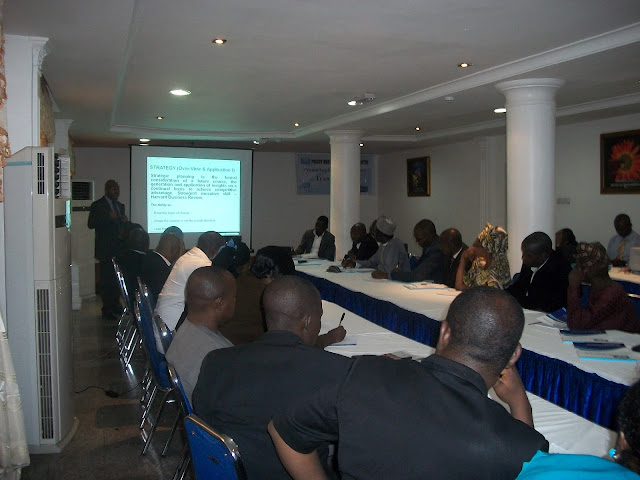 SPACES FOR CHANGE participated in the workshop, Monitoring the 2012 Budget for the National Assembly held on Monday, May 14, 2012 in Abuja, Federal Capital Territory. The workshop brought together officers and staff of the National Assembly Budget and Research Office (NABRO), members of the National Assembly Committees on Budget, Appropriations and Finance, representatives of youth groups and civil society organizations (CSOs) and the media to deliberate on the strategies for formulating realistic budgets and achieving effective budget monitoring in Nigeria. The workshop was a collaborative initiative of NABRO and the Policy and Legislative Advocacy Center (PLAC) with support from the British Department for International Development (DFID).
SPACES FOR CHANGE participated in the workshop, Monitoring the 2012 Budget for the National Assembly held on Monday, May 14, 2012 in Abuja, Federal Capital Territory. The workshop brought together officers and staff of the National Assembly Budget and Research Office (NABRO), members of the National Assembly Committees on Budget, Appropriations and Finance, representatives of youth groups and civil society organizations (CSOs) and the media to deliberate on the strategies for formulating realistic budgets and achieving effective budget monitoring in Nigeria. The workshop was a collaborative initiative of NABRO and the Policy and Legislative Advocacy Center (PLAC) with support from the British Department for International Development (DFID).
NABRO is patterned to fulfill the same objectives as the US Congressional Budget Office (CBO). Resource persons and experts on budget issues drawn from both the private and public sectors were invited to deliver key representations, share important lessons and strategies for maximizing compliance with the principles and global budgetary best practices.
Clement Nwankwo, PLAC’s executive director’s opening remarks espoused the workshop’s overarching objectives of ‘making budgets go through a reasoned, well thought-through process, from design through implementation towards an effective prioritization of spending on programmes within the national budget”. It then follows that the National Assembly needs to pass a budget that it understands.
Describing the 2012 budget as a failure because of the lateness and obstructions associated with its passing and actual implementation, he singled out the repeat of budget heads as one of the issues that budget monitors should take seriously. For instance, every year, same figures are budgeted for specific items (such as cars, air conditioners) that are not necessarily renewed on an annual basis. This scenario means that either the items are procured and disposed yearly, or that the monies allocated for the budget heads are not expended. If they are not expended, what happens to those funds? Are they returned to the nation’s treasury or used for something else? These are questions monitoring would answer, and also sits squarely with the role of NABRO.
Jens-Peter Dyrbak, DFID’s Governance Adviser highlighted specific challenges hindering effective budget implementation. Noting that CSOs have a primary role of making information more accessible and meaningful to people (citizens), he urged CSOs take advantage of the new media to provide first-class analytical information about budgets in a simpler and appealing way.
NABRO’s administrative head, Mr. H.O Olutoye formally declared NABRO office open, marking the commencement of its full-scale operations. “The crisis affecting the budget process in Nigeria is threefold: crisis of formulation, crisis of implementation and crisis of monitoring thereby making budget passing a mere annual ritual. This workshop represents an effort to turn these challenges into opportunities for transformative change in the entire budget and appropriation processes in Nigeria, Olutoye concluded.
In Ogbugo Ukoha’s presentation, “The National Assembly Budget Process: A Strategic Outlook for NABRO”, he observed the critical role NABRO will play in the future of appropriation in Nigeria. Ukoha explained in great detail, the role of the American CBO office that the NABRO office is modeled after. According to him, prior to the establishment of the CBO office, America experienced the same challenges Nigeria is currently facing, such as mounting deficits, backdoor and uncontrollable spending, impoundment of funds.
The recent global economic recession has placed pressure on governments to be more accountable and responsive. In Nigeria, the outbreak of protests over the increase in the pump price of fuel in January 2012 attests to the desire of Nigerians for more transparency and accountability by the government. The 1999 Constitution empowers the National Assembly to make budgetary appropriations and oversee the management of public funds. There is no doubt that legislators need the assistance of experts to be able to play a major role in overseeing the national budget and controlling government spending.



